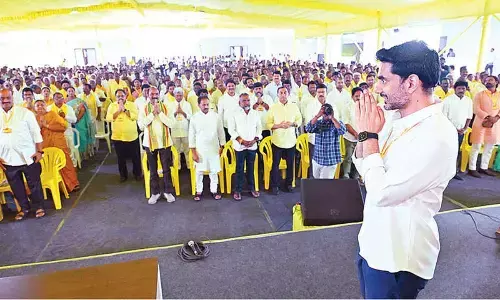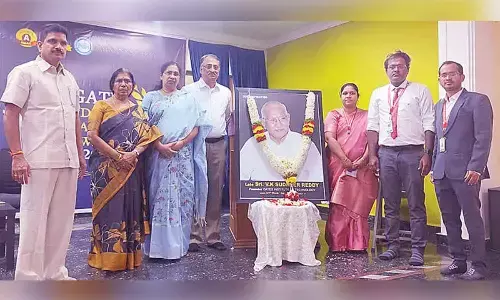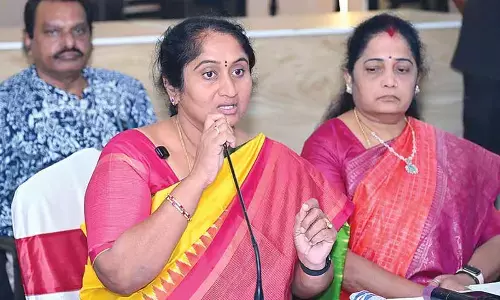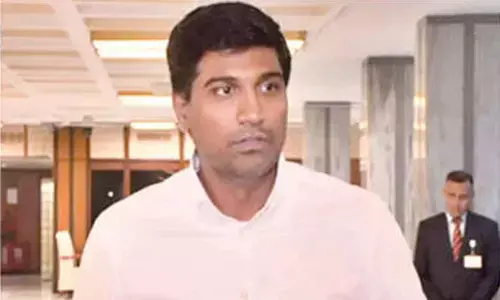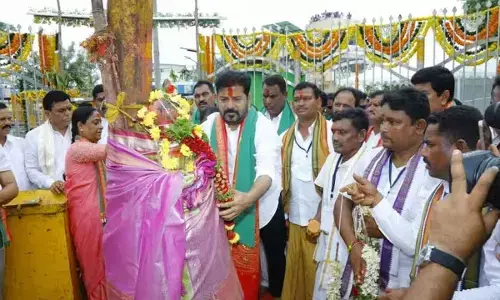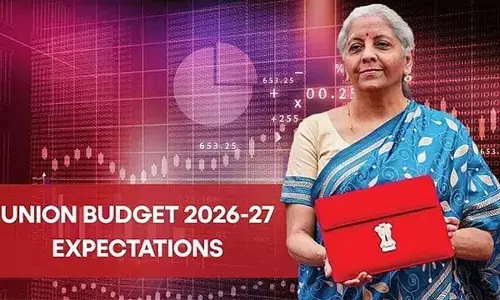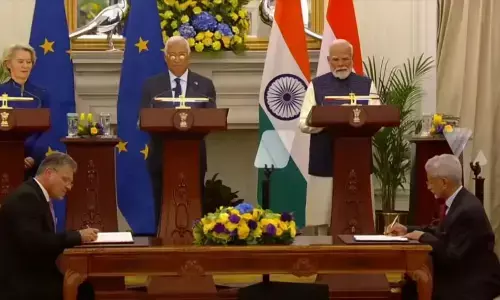The strong lure of sentiment
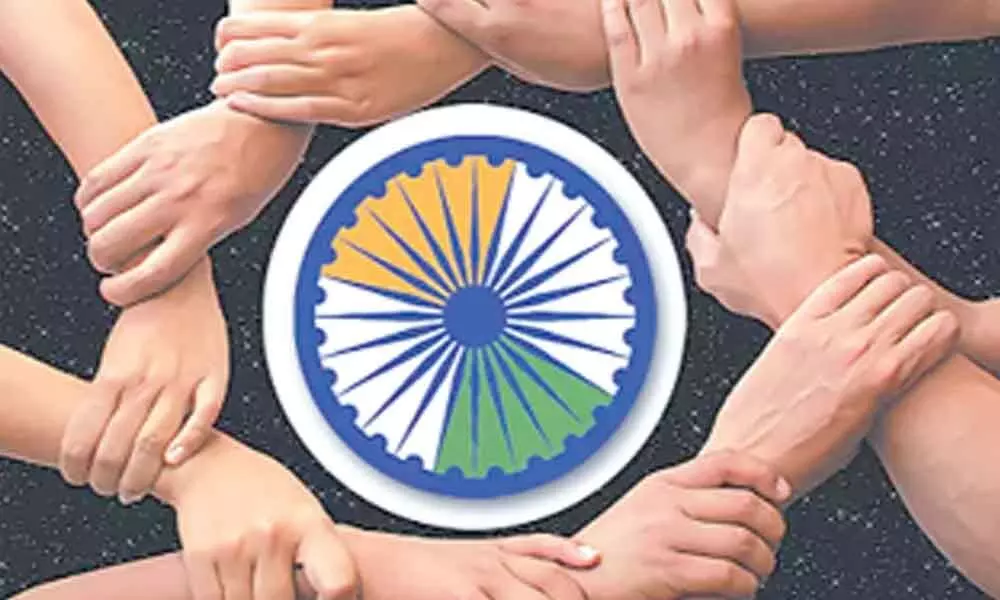
Mankind has always been sustained by the comforting sentiment arising from a sense of belonging. Be it the family, the native village or town, one’s family or friends, the mother tongue or the nation at large, the feeling that ‘I belong to’ has played an important part in shaping the destiny of the world.
Mankind has always been sustained by the comforting sentiment arising from a sense of belonging. Be it the family, the native village or town, one's family or friends, the mother tongue or the nation at large, the feeling that 'I belong to' has played an important part in shaping the destiny of the world. It is that feeling which has remained the source of various forms of expression of nationalist sentiment, such as national flags, anthems, national songs, postage stamps and national birds and animals.
This sentiment is also expressed through other symbols of creative expression, such as the issue of postage stamps and coins. The political philosophy professed by the leaders of countries also bears the unmistakable stamp of the psyche of the people of a country.
Patriotism has also been the theme for the writings of several great men.
The Discovery of India by Jawaharlal Nehru, the Train to Pakistan by Khushwant Singh and Midnight's Children by Salman Rushdie, are a few examples of such literature. While there are no universal symbols of such a nature, the underlying spirit is about sharing characteristics such as history, political goals and other features such as the culture.
The symbols are meant to create a sense of unity among the people of a country by creating visual, verbal or iconic representations of the people, their values, their goals, and their history. Created, needless to say, with the primary purpose of overcoming barriers of caste, community, race, creed, religion and sex. Professing such a spirit through symbols has also often proved to be a bonding element (between countries, or different parts of one country), otherwise quite dissimilar.
Many deeply moving songs have been written, and rendered, on the subject of patriotism. Our own national anthem, composed by no other than Nobel laureate Rabindranath Tagore, is a shining example robust nationalism and stirring lyrics. So is the song which is now accepted as the national song, Vande Mataram by Bankim Chandra Chatterjee.
The feature of there being a national anthem, as well as a national song, is common to many other countries as well, like, for instance, the USA, Britain and Australia. While 'Hail to the Chief' is the personal anthem of the President of the United States. As a matter of fact, the song 'America the Beautiful', by Katherine Bates, written in the 19th century, came close to pipping it at the post at a point of time.
While 'God save the Queen', is the national anthem of the UK, there is no accepted national song, as such. And then we have Australia which has 'Advance Australia Fair' as its national anthem, with 'Waltzing Matilda' being widely agreed to be the unofficial national song. And, speaking of national anthems, 'Amar Shonar Bangla', the national anthem of Bangladesh was scripted by no other than Rabindranath Tagore! Uruguay has the distinction of having the longest anthem with 150 bars and lasting a six minutes.
The Star Spangled Banner, The official national anthem of the USA is a symbol of American history that ranks with the Statue of Liberty and the Charter of Freedom. God Save the Queen, the official national anthem of Britain is used also by many other Commonwealth countries, with some having their own in addition, and has proved a source many patriotic songs in different countries.
Equally full of the passion of patriotism, and unswerving commitment to the concept of One India, are songs such as 'Sare Jahan Se Achha' by Iqbal the great poet. Jawaharlal Nehru was openly moved to tears by the manner in which the legendary Lata Mangeshkar rendered the unforgettable melody Ae Mere Watan Ke Logon, written by Kavi Pradeep, in a gathering, soon after the Chinese aggression in 1962.
Needless to say, every language in India has its own such examples. Looking at the Telugu speaking states as an example, who can fail to find it a hair raising experience to listen to a good rendering of either Desamunu Preminchumanna by Gurajada Appa Rao or Maa Telugu Thalli by Sankarambadi Sundaraachari or, for that matter, Jaya Janani Parama Paavani by Rajanikanta Rao (in Sanskrit)?
Movies have also proved to be a strong medium for the portrayal of such a spirit. The song Cheyyethi Jai Kottu Telugoda from the movie 'Kathanayakudu' is also full of patriotic fervour (for the Telugu people that is), which, albeit in a mildly cynical fashion, extols the achievements of the Telugu speaking people in the past. So is the number 'Telugu Jaathi Manadi' from the movie 'Thalla Pellaama?'.
To a similar genre belong unforgettable compositions, such as Apni Azadi Ko Hum Hargiz Mita Sakte Nahin, sung by Mohammed Rafi, in the film Leader, the rendering of Vande Mataram in her own inimitable fashion by Lata Mangeshkar, in the film Anand Math or, for that matter, Manna Dey singing Kehni Hai Ek Baat Hamey, in the film the Leader. Another song that became a runaway hit for its lyrics and rendering is the rousing number Mere Desh Ki Dharti Sona Ugley, written by Kavi Pradeep and sung by Mahendra Kapoor in the film Uphaar, for Manoj Kumar, the matinee idol who excelled in turning out movies with patriotism as a strong undercurrent.
The moving poem Sarfaroshi Ki Tamanna Ab Hamare Dil Mein Hai, written by Bismil Azim Abad as an ode to young freedom fighters during the independence moment, while not from a movie as such, ranks among the most popular patriotic songs of the country.
National flags have also often been almost the primary expressions of nationalist sentiments all over the world. They are also universally accepted as a unique expression of the nationalism and culture of the people of different countries.
The Indian tricolour has green standing for the fertility of the land, white for peace, truth and purity and saffron, standing for strength, courage and sacrifice indicating selfless patriotism, with the Ashoka Chakra (also called the Dharma Chakra or the Wheel of Duty), in navy blue (the colour which, in Buddhism, stands for love, kindness and peace), in the middle of the white strip, symbolising the philosophy that there is life in movement and stagnation is death.
The 24 spokes in the Chakra stand for the various religious paths available for human beings to lead a virtuous life. The Stars and Stripes, the national flag of the United States of America, has 50 stars each standing for one of the states and 13 stripes representing the British colonies that originally declared independence from the British Crown. The Union Jack, so called as it combines the process of three nations under one sovereign, is the official national flag of Great Britain.
Sports and games have also proved to be a rich source of concepts for the filmdom. The movies 'Chak De India' and '83' are shining examples movies that not only highlight the importance of games, but also underscore the significance of the element of patriotism among sportspersons. Similarly, in Tollywood, as the Telugu film industry is often known, recent box office hits such as Seeti Maar and Lakshya showed how the virtues of games and sports, and the ingredients required for a box office success, can be combined with a strong and powerful patriotic message.
Nationalism and patriotism have no longer the same intense ring they had, in the times before the forces of globalisation shrunk the world, and increased the degree and magnitude of cooperation, and a sense of oneness between countries and their peoples. That having been said, the fact remains that 'enlightened self-interest' continues to be the theme that underscores the attitude of countries, in the realm of international relations. As the Foreign Secretary puts it, in an episode of 'Yes Minister', the foreign office of Britain has been accused of many things but never of 'patriotism'! Lucky, the British!! At least they belong to a country which knows where its interests lie!
(The writer is former Chief Secretary, Government of Andhra Pradesh)
(The opinions expressed in this column are that of the writer. The facts and opinions expressed here do not reflect the views of The Hans India)








